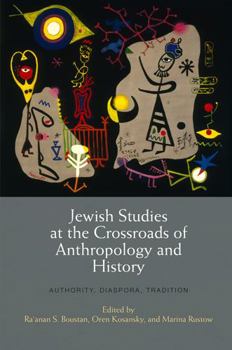Jewish Studies at the Crossroads of Anthropology and History: Authority, Diaspora, Tradition
Over the past several decades, the field of Jewish studies has expanded to encompass an unprecedented range of research topics, historical periods, geographic regions, and analytical approaches. Yet there have been few systematic efforts to trace these developments, to consider their implications, and to generate new concepts appropriate to a more inclusive view of Jewish culture and society. Jewish Studies at the Crossroads of Anthropology and History brings together scholars in anthropology, history, religious studies, comparative literature, and other fields to chart new directions in Jewish studies across the disciplines.
This groundbreaking volume explores forms of Jewish experience that span the period from antiquity to the present and encompass a wide range of textual, ritual, spatial, and visual materials. The essays give full consideration to non-written expressions of ritual performance, artistic production, spoken narrative, and social experience through which Jewish life emerges. More than simply contributing to an appreciation of Jewish diversity, the contributors devote their attention to three key concepts--authority, diaspora, and tradition--that have long been central to the study of Jews and Judaism. Moving beyond inherited approaches and conventional academic boundaries, the volume reconsiders these core concepts, reorienting our understanding of the dynamic relationships between text and practice, and continuity and change in Jewish contexts. More broadly, this volume furthers conversation across the disciplines by using Judaic studies to provoke inquiry into theoretical problems in a range of other areas.Format:Hardcover
Language:English
ISBN:081224303X
ISBN13:9780812243031
Release Date:February 2011
Publisher:University of Pennsylvania Press
Length:448 Pages
Weight:1.76 lbs.
Dimensions:1.6" x 6.2" x 9.1"
Customer Reviews
0 rating





